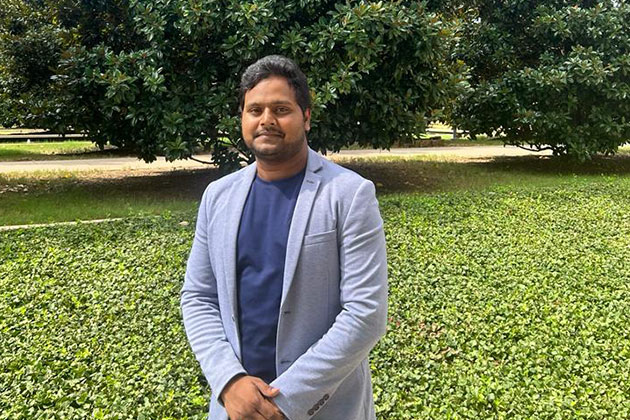
Contents
The Edge of Disaster
Abinav Bayya came to the Naveen Jindal School of Management to pursue his Master of Science in Supply Chain Management. After a turbulent first semester, he found himself on academic probation. This was more than an academic problem. He had taken a student loan, and without good grades, the bank could recall his student loan.
“I felt like I was incapacitated in every way.” he said. “I could see every door closed for me.”
With the deadlines for transferring to other universities having passed, Bayya realized that he might have to return home to India. This would mean returning home without a degree, without a job, and with a huge debt burden. Moreover, he would be letting down his parents and well-wishers.
There was however, one last option left for Bayya, but this would require a change of strategy and some heroic efforts on his part. He elected to try and turn his academic performance around.
“I decided to give myself one more chance,” he said.
Coming to JSOM
While working on his MBA in India, Bayya needed to present a case study about Jindal Steel and Power Limited as part of a group project. Impressed by the growth of the company, Bayya began researching the management team and learned about Naveen Jindal.”
“So, I thought I should become an alumnus like him, no matter which university I go to,” he said. “When I found out that the Jindal School of Management is named after Naveen Jindal, I decided to apply for UTD. And that’s how I ended up here.”
Hitting a Low
Bayya’s application for a visa was initially rejected. He had to reapply and succeeded the second time around. However, this led to his arriving one week after the start of classes. With his focus on the visa and the procedural requirements for getting into the US, he missed the initial classes. He also did not get to research the courses, and professors. In the initial rush, he ended up choosing difficult subjects.
One month into the semester, Bayya realized he was not doing as well as he had expected to.
“My grades were not up to marks in comparison with my friends’ grades.” he said.
When the first semester ended, Bayya realized there were dire consequences for struggling in academics.
He was put on academic probation. This meant that he was unable to apply for some courses. He had to focus on re-taking the courses he had fallen short of expectations on. The bank began threatening to cancel his loan.
On academic probation he could not accept an internship. With his subpar GPA, he could not apply for any on-campus jobs.
Making the Turn
Bayya discussed his situation with John Fierst, the MS Supply Chain Management program director, and Dr. Kannan Ramanathan a clinical professor in the Operations Management Area.
“Every negative was there,” Bayya said. “I just wanted to learn if there is anything positive. Even a small thing.”
According to Bayya, Fierst and Ramanathan provided great counsel and support. Fierst advised him on how to structure his coursework and pointed out the resources that are available on campus.
After that, Bayya met with other professors and spoke with friends who were familiar with different courses.
“I started researching what courses to take for the upcoming semester and opt for a manageable combination of courses,” he said. “If I’m taking one hard subject, I want to balance that subject with an easier course.”
Next, there was the matter of money.
“I had to convince my loan provider that I would be able to come out of the probation,” he said.
While the loan provider was initially doubtful, after hearing Bayya’s case and taking a week to discuss the issue, the loan provider elected to give Bayya one more semester with the stipulation that if Bayya’s grades did not significantly improve then the loan would be cancelled forever.
After all his preparation, the ball was left in Bayya’s court.
“I have to perform now,” he said. “No matter what. While I am not brilliant, I do believe in hard work.”
Struggling to find the confidence to take up the challenge, Bayya sought solitude on campus grounds. On a quiet Sunday, he found himself in the courtyard adjacent to JSOM with magnolia trees, sitting on a limestone bench.
“I decided to ask the magnolia trees to tell me if I can come out of the probation or not,” he said. “To my surprise, they swayed gently, as if nodding in agreement. That sign from nature ended my dilemma and I affirmed to myself that I’m going to do what all is possible within my capacity and then see what happens. With that determination and hope, I began my second semester.”
Strategies to Raise the Grades
In his second semester, Bayya worked hard to ensure he understood his course material thoroughly. He focused on the course requirements mentioned in the syllabus, then the lecture slides and other course materials. He studied hard, formed study circles with friends, took practice tests and checked in with his professors on his progress. If he was having trouble understanding a concept, he talked to other students, his professors and did online research.
When grades came in for the second semester, Bayya realized his efforts had paid off.
Today, Bayya is on track to graduate in May of 2024. After coming out of academic probation, he was able to accept an internship, which he completed over Summer 2023. He was recently selected as a member of the Graduate Dean’s Council.
“Whenever I find myself walking alongside the corridor of magnolia trees, it’s as if they’ve been firm witnesses to the twists and turns of my first-year academic journey,” he said. “Now, when I look at them, it feels as though they are extending their silent congratulations to me.”
Sharing His Story to Help Others
Bayya had the opportunity to share his story at the JSOM Academic Success Boot Camp.
“I initially felt very hesitant to come and speak to the audience in that number because I’ve never done that before,” he said. “The thing that prompted me was maybe somebody in the future will face the issues that I’ve experienced. If there is one student who will go through these kinds of difficulties, I wanted to speak to them. So, keeping that one student in mind, I decided to come and speak straight from my heart.”
His heartfelt speech was met with repeated applause from the audience.
Bayya asks his fellow students to recognize the help and support of others when they are struggling.
“If you’re here, thousands of miles from our home country, it’s not just us,” he said. “Our parents, our family members and other well-wishers, who have put in efforts and possibly some financial support also. They have great expectations of us because they want to see us become successful in life. If we recall all of that, there is no way we can give up.”





